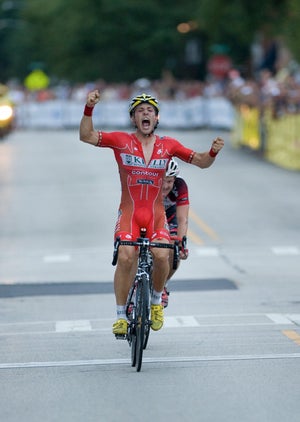American-only criterium championships hit Grand Rapids in 2011 and 2012

USA Cycling announced Thursday that Grand Rapids, Michigan, will host the 2011 and 2012 professional criterium championships. The championships, which moved to Glencoe, Illinois, this season after 24 years in nearby Downers Grove, will also feature only American riders. The 2011 event is set for July 30 and will run in conjunction with the Grand Cycling Classic, a stop on the National Racing Calendar since 2007.
“Criterium-style bike racing is extremely popular in North America and the United States has many very talented criterium cyclists,” said USA Cycling CEO Steve Johnson. “Changing the format of this event to a stand-alone national championship limited to American riders is a great step that will eliminate the current and sometimes confusing disconnect between winning the race and winning the stars-and-stripes jersey. Now is the right time for this change, and Grand Rapids will provide the perfect venue to showcase our top American riders.”
The move to an all-American field will come one year after David Veilleux (Kelly Benefit Strategies) landed perhaps the sharpest blow to the international championships. Replete in his Canadian criterium champ’s skinsuit, Veilleux attacked from a late breakaway and held off Bernie Sulzberger (Fly V Australia) for the win in Glencoe. He crossed the line, arms raised, baring the maple leaf emblem on his chest.
According to the release, four final candidate cities emerged from the bidding process. Glencoe race director Jon Knouse told VeloNews in August that the city did not submit a bid due to the required financial commitment.
“We are very excited to have been selected,” said Mike Guswiler, executive director of the West Michigan Sports Commission. “The Grand Cycling Classic has continued to grow into a popular event in downtown Grand Rapids and now, to have the USA Cycling Pro Criterium National Championships as part of this event, brings it to another level and answers the mission of the sports commission in promoting our region as a premier venue for hosting major sporting events.”
U.S. Air Force and Grand Classic promoter Arlington Sports will host the event. President Rob Laybourn, who has worked hard to gain traction with the latter in the face of expensive travel requirements, looked forward to bringing the championships to his hometown. “Arlington Sports is honored to be the promoting organization for the pro criterium nationals,” said Laybourn, who will act as race director. “Grand Rapids was my childhood home, so I am doubly honored, not only to be selected to run the national championships, but to also be able to bring an event to Grand Rapids and support the mission of the sports commission.”
The crit championships announcements raises two questions:
1) What does this mean for the Tour of Elk Grove, an NRC race typically held the last weekend in July and which usually attracts the same kind of riders who would be at the crit championships?
2) Are the rough roads in Grand Rapids — which many riders complained about at last year’s Grand Cycling Classic — suitable for a national championships?
The answer to the first concern may become clear when USA Cycling releases the 2011 NRC calendar in mid-October. USA Cycling is planning a major re-shuffling of the racing calendar to reduce travel and race conflicts such as the potential crit championship and Elk Grove overlap.
As for the pavement, it should be a sign of concern when riders complain not about the trademark bricks that make up two sections of the course but about the pavement between the bricks. Laybourn guarantees that his team is interested in rider safety first and foremost. “Rest assured if there are any asphalt sections that have rough sections that need repair, we’ll get that fixed…
“The transitions are rough and we’ll look at that,” he said. “We want a course that’s safe.”